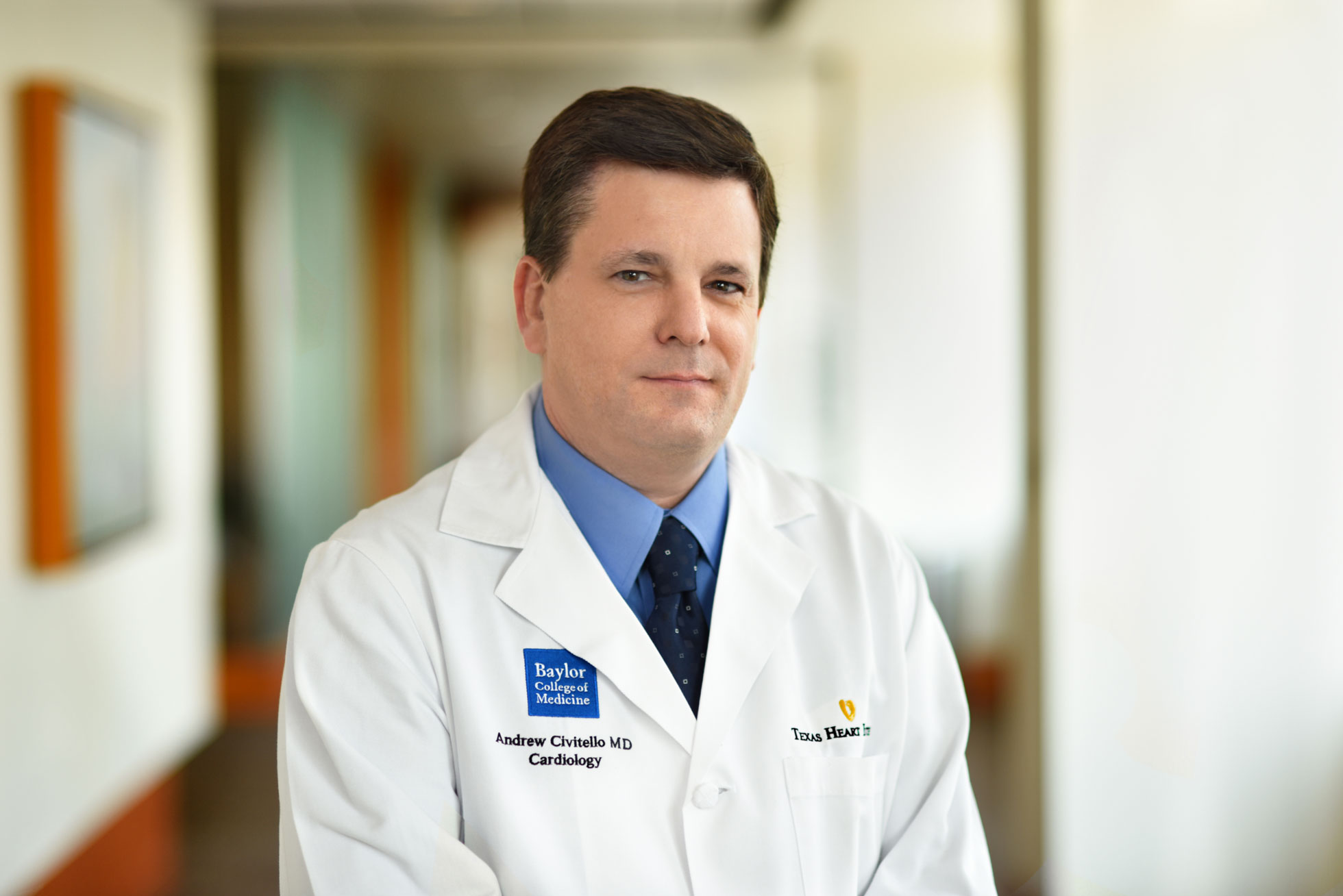Andrew Civitello
Medical Director of the Heart Transplant Program at Baylor St. Luke’s Medical Center, Co-director of Advanced Heart Failure Center of Excellence and Director of the Advanced Heart Failure Fellowship Program
Andrew Civitello
We are one of the nation’s largest cardiovascular centers, the Texas Heart Institute performed the first successful heart transplantation in the United States
With more than 20 years of practice, “Hospitals” magazine had the chance to meet with Dr. Civitello to discuss further our concerns about heart failure and heart transplant.
We would like to know more about your educational journey in Cardiology?
I received my medical degree from the University of Texas Health Science Center at Houston, followed by fellowships in Cardiology and Interventional Cardiology at Baylor College of Medicine and the Texas Heart Institute. My interests reside in interventional cardiology, advanced heart failure management, transplantation and mechanical circulatory support and heart transplant.
What is Cardiovascular Disease?
It is anything involving the heart or the vascular system. It is a class of diseases that involve the heart and blood vessels. It could be a heart muscle disease called cardiomyopathy which is a progressive heart disease that often leads to heart failure.
It could be a heart rhythm disorder or arrhythmia, where the heart tends to beat too slow or too fast. Also, we have heart valve diseases that can lead to problems with blood flow into and out of the heart. Finally, there are diseases of the blood vessels where a substance called plaque builds up in the walls of the arteries. This build-up makes it harder for blood flow through the artery. It also makes it more likely for a clot to form at the area of build-up, which in the coronary arteries can lead to a heart attack and in the cerebral arteries may lead to a stroke. These buildups can also decrease blood flow in the legs and feet, leading to pain with walking and a higher risk of amputations.
What are the symptoms of heart failure?
The major symptoms of heart failure include fatigue and weakness; you feel that you are easily out of breath while you are doing the regular activities that you used to do like walking or going up the stairs. Swelling in the legs, ankles and feet could be also a sign, reduction in the ability to exercise with a rapid or irregular heartbeat.
The symptoms could happen at a very slow pace where people won’t realize they have a problem, that’s why when they come to us looking for answers it would already be clear to us that they have a heart failure.
What is congestive heart failure and what are the treatment options people have?
Congestive heart failure is the inability of the heart to pump blood to the different parts of the body as it should. It is a chronic condition that affects the pumping power of the heart muscle. The treatment options start with lifestyle modifications like low salt intake, quitting smoking, exercising more and having their blood pressure and blood sugar under control. We also have a wide range of medications which are very effective in managing heart failure disease.
Sometimes we use device therapy, like implantable cardiac defibrillator, which has become essential in the management of life-threatening arrhythmia, and to prevent sudden cardiac death.
With worsening heart failure and after using the common therapies without any success, it will become crucial to use device therapy to avoid sudden death in patients.
Which patient is considered for heart transplant and what are the steps to take?
First, we have to make sure that we did everything else and we failed to improve the patient’s situation. If he is still very symptomatic with a very low life expectancy, we could start considering heart transplant. The average life expectancy after a transplant is 10 years. So if we have a young patient, we try to avoid heart transplant as much as we can unless it is the only option we have. Although we had some exceptions, some heart transplant patients made it between 25 to 30 years after the operation but the average is 10 years and some unfortunately didn’t survive beyond 2 years.
To evaluate a patient for transplant, we have to do specialized testing to make sure that the patient is a good candidate, and then we need to find an appropriate match and this is the hardest part. Most importantly, we look at the blood type, antibodies, the size of the heart and the age of the donor.
What are the complications expected after a heart transplant?
Complications involve balancing between the risk of rejection and the risk of infection. The immediate risk that we face is rejection, where we use immunosuppressive drugs to lower the body’s ability to reject the transplanted organ. Because the body knows that the new heart is foreign, it will try to attack the new heart and try to damage it.
After 5 to 10 years the risk of rejection will become very low, but the use of immunosuppressive drugs places the patient at increased risk of infection.
Immunosuppressant drugs decrease the ability of the body to fight infection, but also they increase the risk of developing cancer. Taking these medications will put the patient at a greater risk of both infection and cancer over time.
Can you tell us more about the heart failure center and the services you offer?
We are one of the nation’s largest cardiovascular centers; the Texas Heart Institute performed the first successful heart transplantation in the United States. We are recognized for our outstanding clinical and scientific research programs. Our aim is to provide patients with the best heart care possible from prevention to treatment of cardiovascular diseases.
We have 8 board-certified heart failure specialists and 3 surgeons dedicated to offering the best treatments available to our patients, along with an experienced group of nurses, assistant specialists, pharmacists and physical therapists. Our vision is to become leaders in this area.















